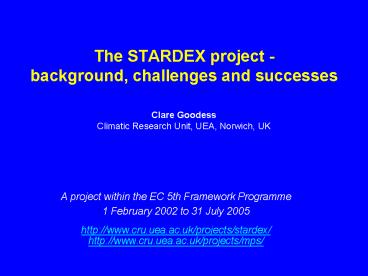The STARDEX project background, challenges and successes - PowerPoint PPT Presentation
1 / 19
Title:
The STARDEX project background, challenges and successes
Description:
The STARDEX project - background, challenges and successes. A project within the EC 5th Framework Programme. 1 ... http://www.cru.uea.ac.uk/projects/stardex ... – PowerPoint PPT presentation
Number of Views:132
Avg rating:3.0/5.0
Title: The STARDEX project background, challenges and successes
1
The STARDEX project - background, challenges
and successes
Clare Goodess Climatic Research Unit, UEA,
Norwich, UK
- A project within the EC 5th Framework Programme
- 1 February 2002 to 31 July 2005
- http//www.cru.uea.ac.uk/projects/stardex/
- http//www.cru.uea.ac.uk/projects/mps/
2
The STARDEX consortium
http//www.cru.uea.ac.uk/projects/stardex/
3
STARDEX general objectives
- To rigorously systematically inter-compare
evaluate statistical and dynamical downscaling
methods for the reconstruction of observed
extremes the construction of scenarios of
extremes for selected European regions Europe
as a whole - To identify the more robust downscaling
techniques to apply them to provide reliable
plausible future scenarios of temperature
precipitation-based extremes
http//www.cru.uea.ac.uk/projects/stardex/
4
Consistent approach
e.g., indices of extremes
http//www.cru.uea.ac.uk/projects/stardex/
5
STARDEX Diagnostic extremes indices software
- Fortran subroutine
- 19 temperature indices
- 35 precipitation indices
- least squares linear regression to fit linear
trends Kendall-Tau significance test - Program that uses subroutine to process standard
format station data - User information document
- All available from public web site
http//www.cru.uea.ac.uk/projects/stardex/
6
STARDEX core indices
- 90th percentile of rainday amounts (mm/day)
- greatest 5-day total rainfall
- simple daily intensity (rain per rainday)
- max no. consecutive dry days
- of total rainfall from events gt long-term P90
- no. events gt long-term 90th percentile of
raindays - Tmax 90th percentile
- Tmin 10th percentile
- number of frost days Tmin lt 0 degC
- heat wave duration
http//www.cru.uea.ac.uk/projects/stardex/
7
1958-2000 trend in frost days
Days per year Blue is increasing
8
1958-2000 trend in summer rain events gt long-term
90th percentile
Scale is days/year Blue is increasing
9
Local scale trends in extreme heavy precipitation
indices
10
Investigation of causes, focusing on potential
predictor variables e.g., SLP, 500 hPa GP, RH,
SST, NAO/blocking/ cyclone indices, regional
circulation indices
http//www.cru.uea.ac.uk/projects/stardex/
11
Winter R90N relationships with MSLP, Malcolm
Haylock
http//www.cru.uea.ac.uk/projects/stardex/
12
Winter R90N relationships with MSLP, Malcolm
Haylock
MSLP Canonical Pattern 1. Variance 44.4.
R90N Canonical Pattern 1. Variance 11.3.
http//www.cru.uea.ac.uk/projects/stardex/
13
Analysis of GCM/RCM output their ability to
simulate extremes and predictor variables (and
their relationships)
http//www.cru.uea.ac.uk/projects/stardex/
14
Mean
90 quantile
HadRM3
HIRHAM
Christoph Frei, ETH
15
Inter-comparison of improved downscaling methods
with emphasis on extremes
http//www.cru.uea.ac.uk/projects/stardex/
16
Radial Basis Function Colin Harpham/Rob Wilby
NW England, 90th percentile for DJF Validation
period 1979-1993 Red observations Blue
predictors selected using stepwise regression,
r0.34 Black predictors selected using
compositing, r0.24
http//www.cru.uea.ac.uk/projects/stardex/
17
At the end of the project (July 2005) we will
have
- Recommendations on the most robust downscaling
methods for scenarios of extremes - Downscaled scenarios of extremes for the end of
the 21st century - Summary of changes in extremes and comparison
with past changes - Assessment of uncertainties associated with the
scenarios
http//www.cru.uea.ac.uk/projects/stardex/
18
Dissemination communication
- internal web site (with MICE and PRUDENCE)
- public web site
- scientific reports and papers
- scientific conferences
- information sheets, e.g., 2002 floods, 2003 heat
wave - powerpoint presentations
- external experts
- within-country contacts
19
- http//www.cru.uea.ac.uk/projects/stardex/
- http//www.cru.uea.ac.uk/projects/mps/
c.goodess_at_uea.ac.uk































